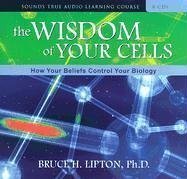
The Biology Of Belief: Unleashing The Power Of Consciousness, Matter And Miracles
Book Description
What if the power to shape your reality lies within your very cells? In 'The Biology Of Belief,' Bruce H. Lipton uncovers the stunning interplay between consciousness and matter, illuminating how our beliefs can influence our biology and redefine the limits of possibility. Through captivating insights and groundbreaking science, Lipton reveals that the mind's thoughts can literally alter our physical health and existence. Every page pulses with the promise of miracles waiting to be unleashed. Could a simple shift in perception transform your life? The truth is more astonishing than you can imagine.
Quick Book Summary
"The Biology of Belief" by Bruce H. Lipton explores the groundbreaking idea that beliefs and thoughts are not just abstract, but have real, tangible effects on our biology. Drawing from cell biology and quantum physics, Lipton argues that genes do not solely determine our fate. Instead, the environment around our cells—including the signals produced by our thoughts and beliefs—shapes genetic expression and health outcomes. The book bridges science and spirituality, suggesting that empowering beliefs can bring about miraculous changes in our bodies and lives. Lipton provides both scientific evidence and personal stories to illustrate how consciousness, through focused intention and perception, can influence health at the cellular level.
Summary of Key Ideas
Table of Contents
Genes Are Not Destiny: The Role of Epigenetics
Lipton introduces readers to the core thesis that genes do not unilaterally dictate our biology. Through his research in cell biology, he uncovers epigenetics—the concept that external factors can turn genes on or off. He emphasizes the cell membrane as a critical interface that reads and reacts to its environment. This challenges the long-held deterministic view of genetics and instead places immense significance on the power of perception and experience in shaping physical reality.
The Power of Perception and Belief
The book explores how our perceptions, beliefs, and subconscious programming fundamentally shape our biology. Lipton explains that our thoughts generate chemical signals in the brain, which are then transmitted throughout the body, influencing the behavior of our cells. Positive beliefs can foster health and healing, while negative thoughts and chronic stress can compromise our wellbeing. This insight reframes the mind from passive observer to active participant in biological processes.
The Influence of the Environment on Cells
Environmental factors, according to Lipton, wield a profound influence over the fate of our cells. He uses both scientific studies and everyday examples to highlight how nutrition, relationships, and the surrounding environment constantly send signals that impact gene expression. Rather than being slaves to their genetic blueprint, individuals have agency through the choices they make, extending from lifestyle decisions to mindset shifts.
Mind-Body Connection and Health
Lipton delves into the science of the mind-body connection, showing that emotions and intent can alter physiological states. Stress, for instance, releases hormones that suppress immune function and increase disease risk, while love and positive outlooks enhance the body’s ability to heal. He stresses that the subconscious mind, often programmed early in life, can dominate responses unless we consciously intervene. Rewriting limiting beliefs thus becomes essential to wellbeing.
Shifting Consciousness for Personal Transformation
Finally, Lipton concludes that by becoming aware of our thoughts and beliefs, we can consciously change our biology and overall destiny. Meditation, affirmation, and other practices can help shift subconscious patterns and foster transformative change. Ultimately, "The Biology of Belief" invites readers to reclaim authorship over their health and life, emphasizing that miracles are possible not by defying science, but through deeper understanding of how consciousness shapes matter.
Download This Summary
Get a free PDF of this summary instantly — no email required.





